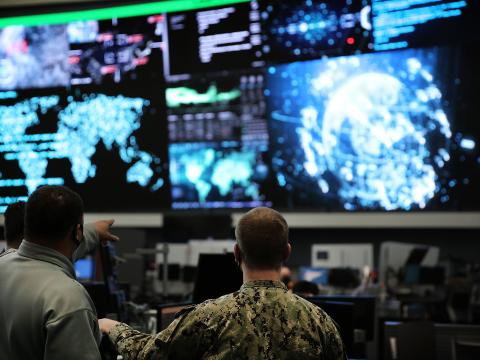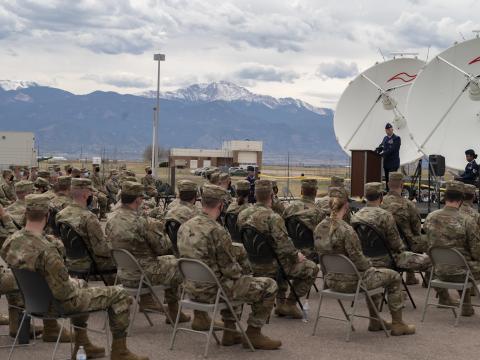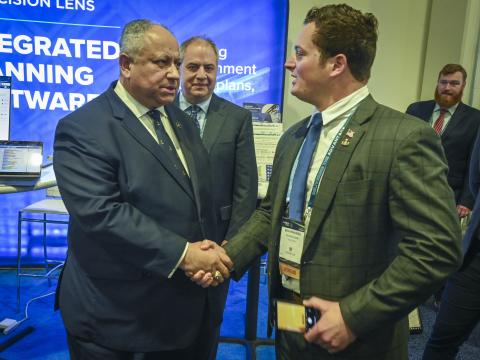It's About the People
Kicking off Wednesday's Joint Warfighting Conference's early afternoon panel on "The Human Dimension: How Do We Develop Our People?", moderator Vice Admiral Albert H. Konetzni, Jr., USN (Ret.), wondered aloud Lincoln would have done with a computer and a Blackberry before moving on to his view of how to develop people: that to engage fledgling leaders, they must feel empowered and have a sense of ownership, no matter their rank.
Kicking off Wednesday's Joint Warfighting Conference's early afternoon panel on "The Human Dimension: How Do We Develop Our People?", moderator Vice Admiral Albert H. Konetzni, Jr., USN (Ret.), wondered aloud Lincoln would have done with a computer and a Blackberry before moving on to his view of how to develop people: that to engage fledgling leaders, they must feel empowered and have a sense of ownership, no matter their rank.
After all, as pointed out by Lt. Gen. David P. Valcourt, USA, deputy commanding general and chief of staff, U.S. Army Training and Doctrine Command, "Our most precise weapon is the soldier on the ground." He explained that training had to have three dimensions: the cognitive dimension, in which simulations and immersive experiences are used to develop decision-making skills; the physical dimension, in which comprehensive strength development creates an army of balanced, self-confident soldiers, families and civilians; and the social dimension, in which warfighters are instilled with character and a warrior ethos, developing their ability to have interpersonal relationships, become culturally aware, and build a sense of cohesion.
The cognitive dimension was particularly significant for Maj. Gen. William J. Rew, USAF, director of operational planning, policy and strategy and deputy chief of staff for operations, plans and requirements at U.S. Air Force headquarters. He noted that air forces do an excellent job with tactical flexibility and adaptibility, in which men and machines do things they weren't trained or designed to do. "But I think we need to develop operational flexibility, especially in command and control, across the range of operations," Gen. Rew said. "Warfare is not clean and neat, and we need operational systems that can adapt to different kinds of fighting."
Gen. Rew also discussed the cultural barriers to true jointness, explaining that too many people think that "cultural awareness" means language training at the academy. There is a need for recognition of the cultural differences across services; for him, he didn't fully understand this until he spent a year as the only airman among a group of army men. "We need to understand the culture of our fellow service members," he said, and continued that we have to do the same thing with our coalition partners, as well. "Some of our command structures we do don't foster than interaction. We like to do things from a distance. We shouldn't forget the importance of the human dimension. Warfare in the end is a people endeavor."
Capt. L. David Marquet, USN (Ret.), a strategist for Navy's QDR Integration Group and
former CO of the USS Santa Fe (SSN-763), agreed, wryly noting that while "the network is good, it's going to go down." America's best strength is its people. "A coherent personnel development strategy... will be more powerful for our country than anything I can imagine," Capt Marquet stated.
Another topic that came up during the panel was the question of whether there was sufficient room for intellectual dissent. Gen. Valcourt seemed to think so, saying that dissent could actually help in complex situations where the goal is not clear. "We are changing fundamentally relationships between who was leading and who was following, and that's important to collaboration and growth," he said. "With that growth comes confidence, and they become more and more able to assume the command and control of the warfighting apparatus."
Gen. Rew noted that disagreement can't really be functional from a bottom-up perspective. "Everyone agrees that we have to be able to dissent, but it has to be fostered from the top to get past from the obstacles," he said.
But Capt. Marquet pointed out the painful reality. "We have a tough time with dissent. Consensus and team player-these are values we like. 'Maverick,' we're not sure we like that guy," he said. Dissenting opinions may lead to fruitful conversations at the "one-star level," he added, but they often don't make it to the top even when they need to be heard. "We should embrace diversity of opinion, but we have a long way to go," he concluded.



